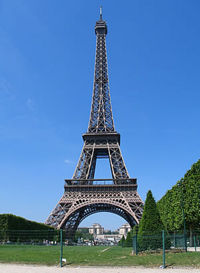Paris
For Paris from the Trojan War please click here
| Paris | |
|---|---|
|
| |
| Country | France |
| Region | Île-de-France |
| Settled | 4200 BC |
| Population | 9,645,000 |
| Area (sq mi) | 1,050 sq mi |
| Population density (/sq mi) | 9,185 |
| Current mayor | Bertrand Delanoë |
| Demonym | Parisian |
| Co-ordinates | 48.8° N., 2.3° W.[1] |
Paris is the capital and largest city of France. It is situated on the River Seine. The population of the Greater Paris urban area is approximately 10 million, or almost one-sixth of the total population of France, with over 2.1 million in the city of Paris itself.
Ajoutez deux lettres à Paris : c'est le paradis. - Jules Renard
History
Known as Lutetia in ancient times, as with many other important cities in Europe, the Romans set up a military outpost (52 B.C.) on the location that would one day become Paris. In 250 A.D. Christianity is introduced by St. Denis. In the 6th century A.D., King Clovis I established Paris as his capital. This was confirmed when Hugh Capet became king of France in 987 A.D. Growth increased under the reign of Philip II (1180-1223) and Paris remained the capital when Louis XIV set up his court in Versailles in 1682. An important legacy of Louis Napoleon was the rebuilding of Paris. Georges-Eugène Haussmann, his city planner and administrative head of the project, carried out a massive restructuring of the city. The Germans occupied Paris in World War II. It was liberated near the end of the war, but was largely undamaged.[2]

Famous Paris landmarks include:
- Eiffel Tower
- Arc de Triomphe (de l'Étoile)
- Arc de Triomphe du Carrousel (in the Tuileries)
- Louvre
- Musée d'Orsay
- Notre Dame cathedral, which was the setting for Victor Hugo's novel, The Hunchback of Notre-dame.
- Place de la Concorde
- The Champs-Élysées
- Les Invalides
- Pont Neuf (the "New Bridge", today the oldest bridge crossing the Seine)
- Pont Alexandre III
- Opera Garnier
- Sacré-coeur
- Montmartre
- Place de la Bastille
- Place des Vosges
- Montparnasse
- Quartier Latin
- Église de la Madeleine
- The Panthéon
- Centre Georges-Pompidou
- Cimetière du Montparnasse (Montparnasse Cemetery)
- The Tour Montparnasse (skyscraper)
- The Grande Arche and La Défense (west of Paris)
Les banlieues
Some of the suburbs around Paris (les banlieues), especially to the northeast, are known for large apartment blocks, housing many of the latest Muslim immigrants to France. These have been rocked by violence as youths rioted against the alleged intolerance of the police forces.
Most of Paris’s high-rise buildings are located in three distinct areas:
La Defense, located in the departement of the Hauts-de-Seine,
Italie 13, located in the southern half of the 13th arrondissement,
and the Front de Seine, located in the 15th arrondissement. [1]
See also
External links
- Paris museums
- Monuments
- Famous Churches and Cathedrals of Paris
- History of Paris
- Paris 26 Gigapixels. Panoramic view of the French capital.
References
- ↑ (1922) World Almanac and Book of Facts for 1923, series: World Almanac and Book of Facts (in English). New York: Press Pub Co. (The New York World), 63. Rounded down towards zero.
- ↑ The New American Desk Encyclopedia, Penguin Group, 1989























